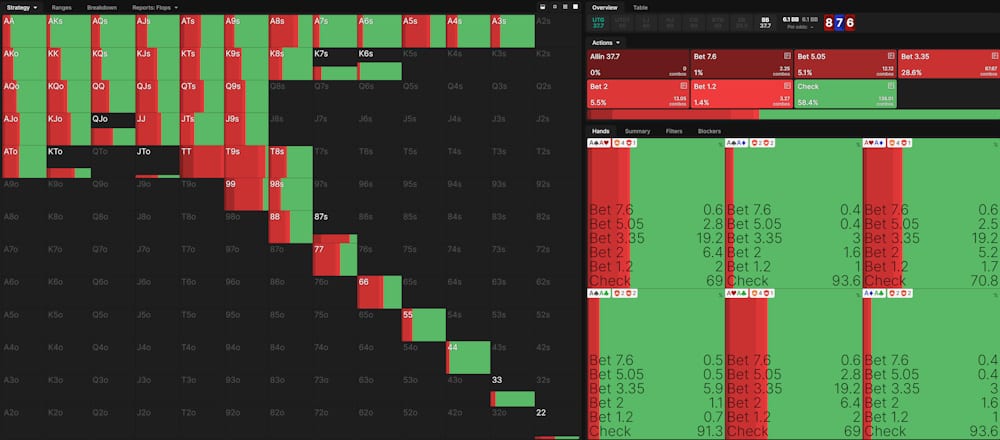Strategy: Continuation Betting Part 4
Dara O'Kearney
In my last article I posed the following question:
You have 40 big blinds and raise under the gun to 2.3 big blinds. Only the big blind with the same stack calls.
The flop comes 8h 7d 6h. The big blind checks.
Which of the following hands would you bet, and would you use a small size (third pot or less) or a large size (two thirds pot or more)?
(A) KK
(B) AA
(C) 33
(D) Ks Qs
(E) Ks 6s
Given that we saw that all of the above hands are either checks or mostly checks, you may be wondering if we ever continuation bet on this board. The answer as we will see in this article is that we do. In this piece I’ll look at the hands we do want to bet, and explain why.
The following diagram is the optimal flop strategy after the big blind checks. Red means bet, green means check.

Most hands bet at least some of the time if we are fully mixing. If not, let’s look at the hands that bet the most frequently.
The hands that bet all or pretty much all the time are T9s (the nuts) and TT. The reasons for betting T9s are obvious: we know we have the best hand right now and are happy to grow the pot as a result. There will be some turn cards we don’t want like a flush completing heart or a card that pairs the board (and could make a house for our opponent) but there are also lots of safe cards we will be happy to continue shovelling chips into the pot with. If we do get safe turn and river cards we would like to get all the chips in, so starting that with a big bet is a good idea.
The reasons for betting TT are more nuanced. You might wonder why we always bet TT but rarely bet KK and AA, technically stronger hands. Here’s why.
First, TT is more vulnerable than aces or kings. It has to dodge not only all the draw completing cards, but also all the paint overcards. If you look at the diagram for optimal continuation betting strategy focusing just on the overpairs, you’ll see that tens bets more frequently than jacks, which bets more frequently than queens, and so on. The more vulnerable our hand is, the more often it should bet.
Second, if you have an overpair and you know your opponent already has a better hand like a set, which overpair would you rather have: aces, kings, queens, jacks or tens? The answer of course is tens. They all have the same number of outs to improve to a better set (2), but tens has 4 additional nines to make a straight. Even having a few outs that improve us to the nuts is incredibly powerful, because it means that no matter what our opponent has or how far ahead he is right now, we can get there, and when we do we can play for it all.
Third, and this is maybe the most subtle difference, is that tens makes it far less likely our opponent has us crushed. Remember the nuts right now on this board is T9, of which our opponent has 16 combinations (four possible tens multiplied by four possible nines), unless we have a ten or a nine ourselves. Having a ten or a nine in our hands is referred to as having a blocker, because it blocks our opponent from having some combinations of the nuts. When we have two tens we have two blockers and the number of combinations of the nuts our opponent can have now is reduced to 8 combinations (the two remaining tens multiplied by four possible nine’s). So when we have TT it’s twice as unlikely our opponent has the nuts compared to when our pair is jacks or better.
Other hands that bet almost always or most of the time are 99 (for similar reasons to TT), KTo and JTo (which makes a good semi bluff as it can improve a lot but is one of our worst hands right now so won’t mind too much having to fold to a check raise), all the sets (note that 77 and 66 bet a little more frequently than 88 because when we have these hands it’s more likely our opponent has an 8 that can call us than when we have 88), A8s (a strong but vulnerable hand that can get called by all the weaker 8x) and some flush draws.
It might surprise you that we don’t bet the flush draw all the time. This is a mistake many amateurs make, and it’s a mistake for two reasons.
First, we simply have too many of them. If you look at the made hands we bet for value, you’ll see we don’t have all that many. That means that if we go ahead and bet all our flush draws, we will have the flush draw most of the time. A perceptive opponent can exploit this by checking raising us, forcing us either to put too much money into the pot on a draw, or fold. This is an important exploit you should incorporate into your game when faced with opponents who play too many hands aggressively, including too many or all their draws. They get away with this because most opponents are too afraid to tackle them and either fold too much (allowing them to win more pots than they should) or call too much (allowing them to hit their draw too often, setting their own price). The correct adjustment to this over aggression is to buckle up and fight fire with bigger fire, raising them more often with both value and good bluffs.
Second, and this is a more subtle point, if we always bet our flush draws on the flop, then when we check and the flush completes on the turn, a perceptive opponent will spot this and know we can’t have the flush now.
87s almost always bets, falling into the category of very strong right now but very vulnerable (even more so than a set as they can get counterfeited if they’re up against an overpair). Our open ended straight draws (9x and 5x) mix betting and checking for the same reason as our flush draws.
Now that we have looked at continuation betting, in my next article I’ll move on to look at how we should respond to continuation bets as the pre flop defender.

DARA O'KEARNEY
IRISH POKER TOUR LIVE POKER STRATEGY COACH
Dara has written three number 1 best-selling poker strategy books (“Poker Satellite Strategy”, “PKO Poker Strategy” and “Endgame Poker Strategy: the ICM book”) with Barry Carter and hundreds of strategy articles for various sites and magazines. I have coached dozens of players of all standards, made training videos for various sites, and cohost the Global Poker award-winning podcast The Chip Race with my good friend David Lappin.
"I have played a number of Irish Poker Tour events and I’ve absolutely loved the atmosphere and craic at them, so when they asked me to start providing strategy content for them aimed at the players who play them, I was flattered and honoured to accept."

Great analysis Dara